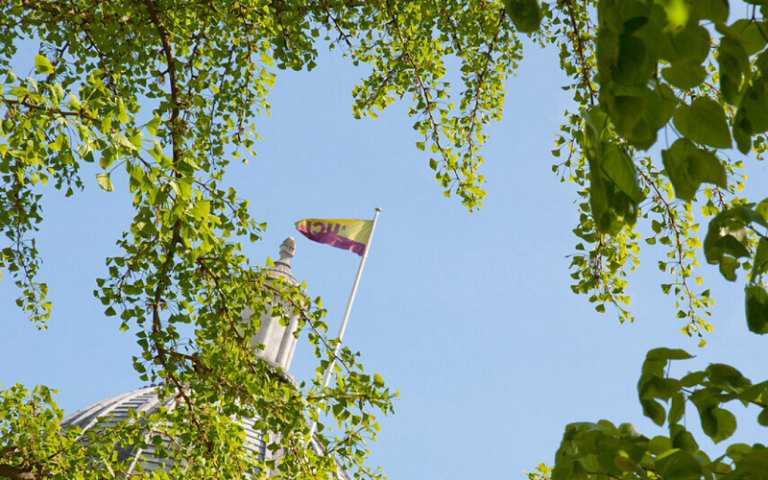Sustainable UCL’s Commitment to Intersectional Environmentalism
24 June 2020
We join the UCL community standing in solidarity against racialised injustice, discrimination and disadvantage.

The recent series of shocking events in the United States, related to police brutality towards African-Americans, have once again propelled longstanding issues of racial justice to the fore of global attention.
We join the UCL community standing in solidarity against racialised injustice, discrimination and disadvantage.
We are also reminded by the scale of global protests and the debates taking place that there are no planetary boundaries to the systemic racism and structural inequalities that underpin injustice.
These injustices affect every facet of our world and environment, as seen in the unequal effects of climate change for countries in the Global South, who are disproportionately experiencing the most severe impacts of global warming from flooding to heat waves, food shortages and homelessness.
Within the multicultural societies of many Western countries, climate change disproportionally affects the everyday lives of BAME¹ communities. In the USA, the environmental justice movement has long demonstrated persistent issues of environmental racism. In England, BAME communities are more likely to live in areas that are worst hit by pollution. For example, in London, Black, African and Caribbean people are exposed to higher nitrogen dioxide levels than the percentage of the population they account for.
Racism also affects participation in climate action aimed at protesting many of these injustices; a BAME activist is much more likely to be confronted by police in a protest than a White activist. Although there are many BAME activists leading the climate debate, we can do much more to amplify their voices and increase the diversity of the environmental movement.
Members of the UCL community have taken some action to highlight climate injustice and offer new approaches to address this issue. The student led Environmental Justice Project is engaging London school students on environment and equity, inspiring a next generation of intersectional climate activists. This year’s Student conference on Climate Change, Vulnerabilities and Displacement invited students to share testimonies of their countries’ experience of droughts, heatwaves, fires, water scarcity or climate-related conflicts.
Researchers ranging from the Bartlett’s Environmental Justice, Urbanisation & Resilience group to the Centre for Law and the Environment and the Lancet Commission on Migration and Health are exploring the connections between climate and social justice.
However, we recognise that we need to do more. Equity and inclusion must be at the heart of our climate action, if we are to succeed. That’s why we as Sustainable UCL, are making the following commitments:
Sustainable UCL commits to practising intersectional environmentalism² that involves recognising and highlighting the historic and on-going work driven by BAME activists here in the UK and around the world.
We aim to make our content as inclusive and diverse as possible by emphasising issues of environmental injustice, sharing stories of BAME activists, scientists, artists, and academics, and working with different groups to ensure our campaigns represent the diversity of UCL.
We will develop a strategy for more inclusive sustainability communications and engagement. We will be hosting focus groups in the following months to understand how we can make our sustainability programmes more inclusive of UCL’s diverse community. Please email Chiara at c.morfeo@ucl.ac.uk, if you would be interested in joining the conversation.
We are currently working with Nick Anim who is researching the lack of diversity in environmental movements, on how we can make our programmes more inclusive and we have developed this statement together with Nick.
References
¹ We recognise that “BAME”, like other umbrella acronyms relating to race and intersectionality, is a contested term. See these resources for further information:
- https://folukeafrica.com/the-only-acceptable-part-of-bame-is-the-and/
- https://blackbritishacademics.co.uk/about/racial-categorisation-and-term...
² We follow Leah Thomas’ definition of intersectional environmentalism as: “an inclusive version of environmentalism that advocates for both the protection of people and the planet. It identifies the ways in which injustices happening to marginalised communities and the earth are connected. It brings injustices done to the most vulnerable communities, and the earth, to the forefront and does not minimise or silence social inequality. Intersectional environmentalism advocates for justice for people and the planet”
Further resources to educate yourself
We urge you to do your own research to reflect on the inclusivity of your environmental work and campaigns. See below some introductory videos, articles and social media accounts to follow.
- Guides
- Environmentalists to follow on social media
Dominique Drakeford @dominquedrakeford
Dr. Ayana Elizabeth Johnson @ayanaeliza
Black Girls Trekkin' @blackgirlstrekking
Jenne Clairborne @sweetpotatosoul
Mary Annaise Heglar @mary.heglar
Dr Robert D Bullard @DrBobBullard
- Books and articles to read
Black Faces, White Spaces by Carolyn Finney
Garbage Wars: The Struggle for Environmental Justice in Chicago by David Naguib Pellow
Confronting Environmental Racism: Voices From the Grassroots by Robert D. Bullard (Editor)
London’s black communities disproportionately exposed to air pollution
Climate change and air pollution are race issues
Climate change is a racist crisis: that’s why Black Lives Matter closed an airport
Colonialism, The Hidden Cause Of Our Environmental Crisis
White Supremacism and the Earth System
Black Environmentalists Talk About Climate and Anti-Racism
I’m a black climate expert. Racism derails our efforts to save the planet
The environmental movement is very white. These leaders want to change that.
- Films and videos to watch
Netflix Documentary: There is something in the water
Come Hell or High Water: The Battle for Turkey Creek
How Black Lives Matter And Environmental Justice Are Connected
Share your recommendations for more BAME environmentalists with us via c.morfeo@ucl.ac.uk.
 Close
Close

